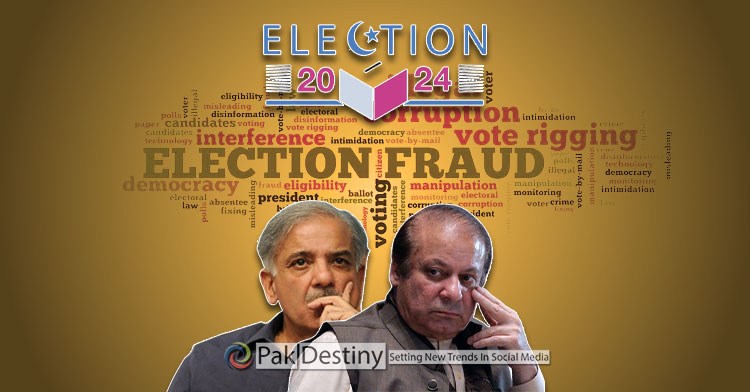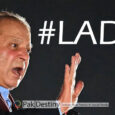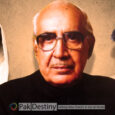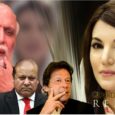
The Sharifs looked up set in the National Assembly…why? Because they are beneficiary of the stolen mandate?
It seems so.
Dawn aptly mentuons “let there be (dis)order — if the first session of National Assembly is anything to go by, the newly elected house is set to be one of the most “paralysed” in the country’s parliamentary history.”
Dawn further writes the first day of the newly elected National Assembly panned out just as expected: rancorous PTI members, now part of the Sunni Ittehad Council (SIC), protested over the alleged election rigging and the arrest of their party founder Imran Khan.
“For those who were there, the clamour on the first day of the assembly’s inaugural session refreshed memories of the 2002 house where the then opposition, comprising the two major parties — PPP and PML-N — kept the house paralysed for months.”
On Thursday, the two parties, set to form the government this time, got a taste of their own medicine, albeit while being on the other side of the aisle.
They should probably get used to it, as the PTI-backed lawmakers have announced the plan to protest in every sitting till the time they get back the seats allegedly snatched from them through manipulation of the election results.
“If the first session of National Assembly is anything to go by, the newly elected house is set to be one of the most ‘paralysed’ in the country’s parliamentary history. Seeing the composition of the PTI members comprising some firebrand speakers and the party’s track record of doing aggressive and agitational politics, many political experts believe that the party is capable of disrupting the assembly’s proceedings for a long time, thus making things difficult for the upcoming coalition government, being dubbed the “PDM 2.0.”
In 2002, the then opposition parties, PPP and PML-N, with the support of Muttahida Majlis-i-Amal and some nationalist parties, refused to provide legitimacy to the Legal Framework Order (LFO) through which the then military dictator Gen Pervez Musharraf made a number of amendments to the Constitution.
“They disrupted every house sitting through constant desk thumping and sloganeering, thus forcing the former dictator to engage opposition parties, finally resulting in their alliance’s break-up. Only then was the house able to conduct its businesses. The difference, however, is that 22 years ago, there were seasoned politicians in the opposition alliance like Javed Hashmi, Nawabzada Nasrullah Khan, Makhdoom Amin Fahim, Qazi Hussain Ahmed, Shah Ahmed Noorani and Maulana Fazlur Rehman.”
Mr Rehman and other seniors, like BNP President Akhtar Mengal and PkMAP head Mehmood Khan Achakzai, are on the opposition benches this time, but many believe their presence will not tone down the ruckus.
“Heavily outnumbered, these leaders will not be in a position to exert control over the opposition alliance, with more than 90 SIC members who’d be getting direct instructions from their jailed leader through his counsel-cum-parliamentarians. PTI’s hotheaded MNAs, Sher Afzal Marwat and Jamshed Dasti, left no doubts about their intentions to paralyse the house,” Dawn writes.
A few of their other senior colleagues avoided the hard line and simply said the assembly that “came into existence as a result of the blatant and massive rigging may not last long”.Mr Mengal, however, was the voice of reason, saying the country needed “general surgery” as cosmetic measures would not bring any improvement.
“Some PML-N and the PPP members also raised slogans in favour of their leadership and against Mr Khan, but they showed restraint and avoided a direct clash with SIC members.”
A senior journalist credited PTI leadership for keeping a hold on their nearly 100 members when it was predicted that some would ditch Mr Khan and join the government.
Another senior journalist commented that seeing the grim faces of those set to form the government was surprising.
Previously, the prospects of forming a government used to elicit emotions of joy, at least in the initial days, aptly called the government’s “honeymoon period”.
There were three senators — PML-N’s Nuzhat Sadiq, JUI-F’s Abdul Ghafoor Haideri and PPP’s Yousuf Raza Gilani — who took the oath as MNAs after resigning from the upper house.
Many were surprised to see Mr Gilani taking oath as he was being tipped as a candidate for the Senate chairman. His oath as MNA reaffirmed reports that the ‘establishment’ had suggested the names of Sadiq Sanjrani and incumbent caretaker prime minister Anwaarul Haq Kakar for the Senate top post.
A PPP source, however, told Dawn that Mr Gilani and some other party senators, who were elected as Sindh MPAs, had resigned since the Constitution bars memberships of multiple houses.
Mr Gilani would resign from NA after casting his vote for the PM and the president, and he would be re-elected in the Senate to become its chairman, the source added.
“Some prominent politicians who took oath on Thursday had returned after a long hiatus. Among them are PML-N’s Nawaz Sharif, Anusha Rehman, Sardar Yousuf and Tehmina Daultana; PPP’s Nabil Gabol and Ijaz Jakhrani; MQM-P’s Farooq Sattar; PML-Z’s Ijazul Haq; and JUI-F’s Maulana Fazlur Rehman and Abdul Ghafoor Haideri. Besides, PPP’s Shehla Raza and Sharmila Farooqui took oath as MNAs for the first time,” the paper says. PAK DESTINY






